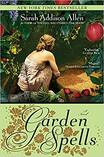Sacred Chickens
Menu
SACRED CHICKENS
 Garden Spells Author Sarah Allen by Jarad Johnson Sometimes, I buy books for the title. That’s probably not the right way to do it, and I’m sorry…(not really, but some of you were clutching your pearls, and I wanted to give you a little comfort. This parenthetical observation probably counterbalanced that; in which case I am kind of sorry). However, in rare instances, I find that the title is so compelling, reading the dust jacket is not necessary for purchase. I will admit that buying a book based on the title is risky; sometimes if I had read the blurbs or synopsis, I would have been prevented from giving my monies to an author who poured all the originality into the title instead of the contents within. But sometimes, it’s worth the chance. It’s a reading adventure! And that is exactly how this little book by Sarah Allen grabbed my attention. It was around midterms, on Halloween night in fact, and I was in a bookstore with a friend of mine, wandering around and making fun of book titles. This is how English majors party. Truth be told, I’m a bit of people watcher, and Halloween night is great for voyeurs of the human race. People are weird, and seeing their little idiosyncrasies is endlessly fascinating. That night I saw a child was dressed as fairy, but an angry little fairy, mad about whatever makes kids upset. I got to observe the fairy throwing a temper tantrum, sitting on the floor, arms crossed, sobbing hysterically. Come to think of it, probably very fairy-like. About the time that was going on, an obviously drunken devil wandered in a costume far too tight. Halloween is the best. (I also often sit in the courtyard at school and watch people going to class. I’ve seen people cry, scream and laugh, all in the same day. Who knows…I may have observed you at some point. You’re all very strange, but often entertaining.) In spite of the fact that the evening was very entertaining, or maybe because I was distracted, it was one of those bookstore trips where nothing stood out to me. I made my third or fourth trip around the fiction section before I saw the title, “Garden Spells.” Now, I had a peace lily that was angry at me and protesting how much light I was giving it, so I really hoped that the book was full of incantations to bring plants back to life. It was certainly worth a try, at least. But no such luck. However, there was a story and that’s almost as good as a spell. This story, like any good spell comes complete with tropes and symbols that have long buried themselves in the collective unconscious. In other words, it’s not what I would call original, but that’s not a bad thing! Nothing is truly original, and every writer takes from every other. This story is like comfort food for the soul; it won’t make me gain weight, but my inner self felt quite full after reading it. Predictably (for me anyway), it centers around witches, and gardening. It’s very similar to Practical Magic, one of my favorite movies. The plot centers around a family of witches who have a large garden that contains a very cantankerous apple tree. Speaking from personal experience, apple trees are fussy. I had one toss me off a ladder twice last week. But this one in particular stands out, having a proclivity for throwing apples at people who make it angry. My apple trees aren’t quite that bad but give them time. The tree can tell you your future if you take a bite of its apples, and when it sees someone in trouble it tends to throw apples at them or to them. Like the tree, the garden also sends messages and has its own way of speaking to the women of the house. Ivy appears when there is an invasive and tenacious person in their life, someone who is difficult to get rid of. This is of course seen as magic, and of course it is, but anyone who is regularly around plants understands that they have their own way of speaking to the gardener. You can tell when a plant has had too much water, or too little. Plants show when they are diseased, when they’re placed in the wrong spot, or when they have too much or too little sunlight. Personified in Allen’s tale is the language of plants, what you might call a visual language, and the people who know how to listen. The witches who take care of the tree are as unique as the garden. Their abilities manifest in different ways, according to their personalities and inclinations. One may be good at telling the future, one is good at baking spells into food, and one gives people items that they need but cannot tell them what it’s for. This is not an overt magic. There are no lighting beams shooting from their fingertips, no great feats of wonder. In short, their power is not blatant, and does not overbear on the story. That brings something interesting to mind that I’ve been thinking about lately. Good books do that naturally. They are powerful in nuanced and subtle ways, the power flows deep underneath. Perhaps, this foundational, quiet power is necessary for witches, mostly female…unable to display power ostentatiously. In essence, a witch is a woman who has power that a man does not. She exists outside of the paradigms of power that govern our society. Not only are these paradigms unfair, they’re quite boring. The people who are indoctrinated into patriarchal systems of power are not only, in my experience, somewhat unhappy, they are also extremely limited in their ways of thinking. Sorry for those of you that qualify for that description, but when you delineate people into rigid binary ways of thinking, you tend to become un-original, banal in both your actions and your thoughts. Anyway, when you think about someone who has power, I think the patriarchal, stereotypically male driven view of power is someone who performs great, larger than life feats, like wielding lightning or something of the sort. Something powerful, and usually violent. There again we see a connection between the wielding of power and its relation and often its reliance on violence. We do not see that here, in this book, and I think that is very interesting, because these women are still very powerful, but they do not rely on external forces or indeed do not have a need to prove how powerful they are. Those who have power often take up space. I don’t just mean physical space, but space in the culture, in every aspect of it, they exclude those who subordinate their power or who don’t fit with the paradigms of their system. We see this literalized, many times, with the classic puritan witch stories. A woman, on the outskirts of town, who has power and knowledge that the people (usually, by which I mean ALWAYS, men) do not. Patriarchal wielders and upholders of power are usually jealous safeguards of it, and what’s interesting about Addison’s characters is that they manage to maintain their power and allow space for others to exist within that framework. It’s quite a different perspective than the power we usually see. The only thing I have to say in the negative about this book, is that sometime the tropes Addison uses contradict her message of powerful women. She employs what I call the Woman-Without-A-Man syndrome. For example, one character is a woman who is miserable in her life, unhappy and dejected, and the plot shortcut is that she is happy after a man sweeps her off her feet. This trope puts the power in the hands of the man, not the woman. To say that she is somehow incomplete without a husband is misogynistic at some level. This often-used plot device is one that needs to be carefully considered. Now, I’m not saying that being with a man is misogynistic, but the idea that a woman needs a man him to be a fully formed, happy human being is, most definitely. No one’s happiness, and by extension their validation and sense of self, should be dependent on any external force. No one should have that power (there’s the word of the day I think) over you, and unfortunately in real life, women tend to buy into that myth, constantly searching for happiness in the form of a mate. Certainly, happiness is influenced by other people, that’s inevitable, but perhaps happiness isn’t the right word, because happiness is fickle and fleeting. Your validation of yourself, let’s say. Those things come from within, that is what makes you an independent person. And that is one of the ways, I think, that allows you to keep your power and maintain your independence. In short, I wish the author hadn’t taken this plot shortcut…as you can probably guess by now. The quality of the writing is something that you know I will always mention. In this case, it flows easily, like good writing should. I often think of good writing being like a river, flowing ceaselessly towards an inevitable end, never branching off or stopping at an unnecessary riverbank. It doesn’t overpower the story and tells it very effectively. When there are no obvious or discernable flaws to point out, it can be difficult to find something to say other than how good it is. It’s a problem I’m sure book reviewers run into all the time; I certainly do! However, I like to point out what worked for me as well as what didn’t. So, although the story falls into a few pitfalls and worn-out tropes, I still think it’s worth reading, and I greatly enjoyed it. It came at just the right time for me, and it’s one that I can see myself revisiting when I need it next. Hopefully no errant apples hit me on the head!  Bio: Jarad is the co-administrator and writer for Sacred Chickens, attends college at MTSU, loves tea and coffee, and tries to spend every spare second reading. He recently developed an interest (some might say obsession) with gardening. Jarad is an English major with a concentration in literature. Bless his heart! Let's all light a candle for him and send him happy thoughts!
0 Comments
Leave a Reply. |

Click Photo above to buy ebook or paperback from Amazon.
Here's the link to Barnes and Noble Or order through your favorite independent bookstore! Categories
All
|
 RSS Feed
RSS Feed